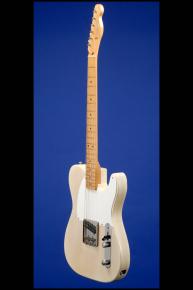Super Rare 1959 "Top-Loader" Esquire.
1959 Fender Esquire (Toploader).
This early '59 blond beauty weighs just 6.40 lbs. and has a nut width of just over 1 5/8 inches and a scale length of 25 1/2 inches. Solid ash body and fretted maple neck with a medium-to-thin profile and 21 frets with black dot position markers. Single "butterfly" string tree with no spacer. Headstock decal with "Fender" spaghetti logo in silver with black trim and "Esquire" in black below it. Individual "single-line" Kluson Deluxe tuners with oval metal buttons and "D-169400 / Patent No." stamped on the underside. The neck is dated in pencil "3-59" and the pickup cavity is also dated in pencil "3-59". Four-bolt neck plate with serial number "36105" between the top two screws. One single-coil pickup, angled in bridge plate, with a huge output of 6.37k. Single-layer white plastic pickguard (.06 inches thick) with five screws. Two controls (one volume, one tone) plus three-way "tone" switch with "top-hat" tip, all on metal plate adjoining pickguard. Potentiometers stamped "137 825" & "137 847" (CTS June & November 1958). Chrome knobs with flat tops and knurled sides. Rare "top-loader" Telecaster/Esquire combined bridge/tailpiece with three steel saddles and stringing through the ridge on the back of the base plate. There is some light edge wear but the guitar is exceptionally clean and the 'bluish' grain of the ash shows beautifully through the blond finish. There is some very light wear to the original frets but virtually no wear to the birds-eye maple neck which also has some nice 'flame'. This is the only "top loader" Esquire that we have ever seen and it is in exceptionally fine (9.00) condition. Complete with its original "ashtray" bridge cover. Housed in a later Fender, three-latch black hardshell case with black leather ends and red plush lining (8.00).
This guitar has the following entry in Werner's List: "36105 Mar 59 Esq Bridge strung". In Werner's list there are twelve entries for "top-loader" Telecasters from August 1958 through March 1961. There are only six entries for
"top-loader" Esquires from October 1958 through December 1959 (including the present guitar).
"In late 1958 the string-through-body pattern was suspended and replaced for about a year by a top-loading system. On "top-loader" guitars, the 6 string holes are drilled in the back ridge (and not in the flat base) of the bridge plate. However, when FENDER reverted to the original string-through-body loading, the existing inventory of top loader bridges was re-drilled [typical of Leo Fender] with 6 string holes in the flat base. As a result, late '59 and 1960 guitars usually come with a bridge plate drilled for both loading patterns." (A.R. Duchossoir. The Fender Telecaster. p. 67).
"Leo Fender's new solidbody was the instrument that we know now as the Fender Telecaster, effectively the world's first commercially successful solidbody electric guitar...The guitar was originally named the Fender Esquire and then the Fender Broadcaster, and it first went into production in 1950. It was a simple, effective instrument. It had a basic, single-cutaway, solid slab of ash for a body, with a screwed-on maple neck. Everything was geared to easy production. It had a slanted pickup mounted into a steel bridge-plate carrying three adjustable bridge-saddles, and the body was finished in a yellowish color known as blond. It was unadorned and like nothing else. It was ahead of its time (Tony Bacon, 50 Years of Fender, p. 10).
"After a false start the Esquire re-appeared...in 1951, now with Fender's new adjustable truss-rod. It was offered in single-pickup format only, but otherwise was virtually identical to the two-pickup Telecaster. However, the Esquire's three-way selector functioned as a preset tone control or bypass switch, offering wide versatility from a one-pickup guitar. Perhaps surprisingly, the Esquire stayed in the line for 20 years" (Tony Bacon and Paul Day, The Fender Book, p. 10).












